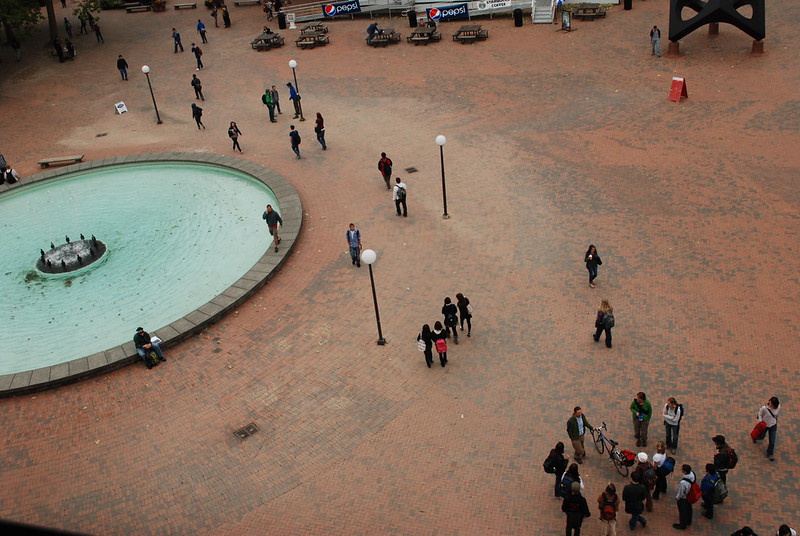Aerial view of Red Square and Fisher Fountain. Layna Bennehoff
By Kiaya Wilson
Western’s chapter of Young Americans for Freedom [YAF] chalked across Red Square on the night of Feb. 19, and became upset when students from Western’s chapter of Young Democratic Socialists of America [YDSA], along with students not affiliated with the club, began washing off the chalked phrases.
YAF wrote anti-socialism phrases that read “freedom not socialism,” “socialism sucks” and “free speech not political correctness.” YAF also wrote “blue lives matter” and took a picture with a university police officer. Various students worked to scrub off the chalk as they walked through Red Square throughout the night of Feb. 19. YDSA members also held a scrubbing “event” the morning of Feb. 20 and the messages were gone by 8:30 a.m. on Feb. 20.
Jenn Cook, club activities manager, detailed the specifics of this incident.
“There is no policy for erasing or crossing out or writing over them [the messages],” Cook said. “Not to say specifically that you have free speech in erasing it but we don’t want to say that you can’t. What we would hope is more actual dialogue … that is constructive.”
According to Western’s chalking guidelines, chalking is allowed in Red Square to express ideas and share information, but it is prohibited on walls, columns, art work, tables, benches or any part of a facility or structures. Therefore, YAF didn’t break these guidelines with their messages on the brick, but they did break the guidelines by chalking on Fisher Fountain.
“We reached out to facilities management and told them who to charge, which would be the club,” Cook said. “We haven’t heard anything from them [facilities management] yet, but someone would get charged for the time and energy used to clean up the chalk.”
According to YDSA’s statement, many students have expressed outrage over the chalking, including members of the Young Democrats of Western. YDSA emailed a statement to the Associated Students expressing their concern regarding the messages that YAF wrote.The Young Democrats of Western also released a statement on their social media pages expressing their solidarity with YDSA.
“We believe that this incident was in direct response to a YDSA Red Square tabling event, in which multiple YAF students came up to our table, attempting to instigate an argument, to which we did not respond to,” the statement said.
Cook said that she met with both clubs to discuss what happened and where to go from here. She also said that she wants to make sure other clubs are aware of the chalking guidelines.
“We intend to have a message sent out at the start of the quarter,” Cook said. “We’re working on edits [to the guidelines] to give more details, to be more clear and transparent.”
Cook said this incident is difficult to handle because it’s not hate speech, although the chalking did involve sensitive phrases such as “blue lives matter.”
“When it becomes hateful language against protected groups, then that becomes an issue,” Cook said. “Things like ‘blue lives matter’ is on the line of we understand the significance but it’s not hate speech. We understand the impact of it, but it’s not hate speech, and that sucks.”
YDSA detailed the sensitivity of the phrase “blue lives matter” in their letter by providing background on the phrase and the impact it may have on the Western community.
“Black lives matter was founded in 2013 by three Black women, the following year in 2014, Blue Lives Matter was founded by three non-Black men as a counter to this movement,” the statement read. “Black Lives Matter sees this as an attack on the existence of black students on campus, especially considering this is occurring on Black History Month. This is not only extremely insensitive, but also promotes anti-black sentiments and is a triggering message for Black students on campus.”
YAF, YDSA and the Young Democrats of Western have not responded to inquiries for interviews about this story.
In the wake of the COVID-19 complications, Cook said she’s not sure when the guideline revisions will be made, but hopes they will be in spring quarter 2020.

